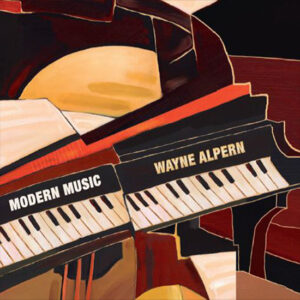
By Brice Boorman
Wayne Alpern’s Modern Music, twenty miniatures for solo piano played with clear precision by Steven Beck. The music is a stylistic tour in how a composer scripts music that sounds current with today’s aesthetics. The album is a Henri Elkan Music release, June 27, 2025; Steven Beck at the keyboard; the record’s defining trait is the way Alpern writes with a balance of classical influences in forms and sections that are Alpern improvising through his pen. Alpern delivers on the listener’s expectations of hearing modern piano music. The works flow with cadential feints, metric swerves, and tongue-in-cheek registral jabs. It’s classical containers filled with timing and groove borrowed from jazz, Broadway, and modernist rhythm.
The album’s palette has Baroque counterpoint here, impressionist sheen there, and Broadway warmth and jazz harmony throughout. Listen through the thread of expectation, and you’ll hear the allure of how Alpern orchestrates when and how we think phrases will land. “Prelude,” for instance, treats voice-leading to build to cadences set up to resolve, but slide sideways at the last second, a move Beck renders with a cool wrist and a composer’s ear for line. That sense of inevitability-then-swerve is very rewarding to hear. The modern voicings presented as a fait accompli before being gently displaced.
“Variations” is a case study in this sleight of hand. You can hear Alpern pulling an early-classical theme through jazz-waltz harmonies and inner-voice counterlines that hint at mid-century piano language. The trick isn’t the collage, it’s the cueing. He primes your ear with a square antecedent-consequent phrase, then shortens the consequent on repeat, dropping you into the next variation a beat early like a deft emcee. The result is a forward tilt, a dramaturgy of fours and sixes that nudges the listener ahead of the downbeat.
When Alpern goes dance-derived, expectation becomes propulsion. “Gigue” spins a bright 6/8 pulse with voices leaping in contrary motion, but the hook is how he accents the barline. Light offbeats that keep the floor moving while delaying the real cadence, while your feet insist on moving to the steady pulse and accented syncopations. Beck’s delivery keeps every countersubject audible without pedantic separation. Alpern’s writing is filled with dazzling counterpoint.
“Fughetta” offers a punchline built about tradition. Born as a student counterpoint exercise, Alpern discovers that the moment you place a jazz-colored appoggiatura on a Baroque subject, the cadence winks. Written out, yes, but composed to sound like spontaneous reharmonization, the kind pianists do mid-chorus. One realizes that these pages are scripted rather than improvised, and that’s the compositional point. Alpern packages the sensation of improvisation and its surprise, inevitability, and after-the-fact logic inside notation.
“Raga” formalizes that strategy through meter. In 10/8 grouped 3+3+2+2, the pattern resets at precisely the moment your body expects squareness. Alpern handles the writing in a way that makes the asymmetry create the groove. Each phrase refreshing the phrase for an element of surprise. Heard next to “Partita,” where courtly dance rhetoric gets a modern harmonic spine, you can trace a single craft problem: how to keep the cadence fresh, which is solved by different means. The modern music has a classical genre DNA with its historic style; the throughline, though, is Alpern’s timed rhythmic figures.
“Reverie,” conceived as a minimalist lament, has a steady arpeggiated bed. Upon closer listening, a pattern of micro-suspensions that delay expected closure by a breath is the allure. Beck’s touch, and Judith Sherman’s clear, unfussy production, make those micro-delays legible without underlining them. We hear release arrive when Alpern scripts it, rather than when our ear predicts it, which is to say we hear grief measured as temporal slippage.
Alpern has long been developing a reputation as a composer-arranger who animates classical forms with vernacular idioms, “reanimat[ing] centuries of techniques” rather than collaging them. On Modern Music the emphasis shifts from what he blends to how he times it. The record becomes a workbook in notated spontaneity. He conveys how to write cadences that grin, meters that lean, counterpoint that suggests an improviser’s “of course” in hindsight. Listeners will also hear the jazz influence as Alpern has smuggled the effect of improvisation into composition itself. Resulting is structured modern music with daring and surprise.
Steven Beck is the right partner for this sort of legerdemain. His playing has structural clarity and virtuosic glare. You hear subjects enter like characters, inner voices acquire agency, and cadences land with theatrical timing. Sherman’s production keeps the piano present. The program spans the style palette as the listening experience reveals a composer choreographing your expectations with meticulousness.
Modern Music is less a cabinet of styles and more a manual for timing. Alpern writes as an architect of the listener’s next breath, where it catches, where it releases, where it laughs, and Beck builds the rooms so we can feel those shifts in our bodies. That is the album’s true modernity.


